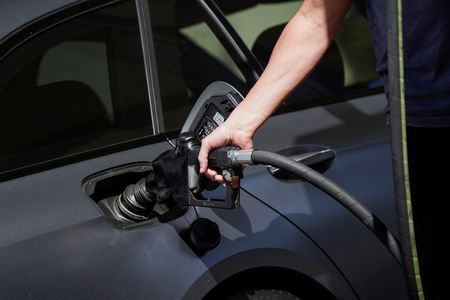
By Laura Sanicola
(Reuters) -The national average price for U.S. gasoline rose above $5 a gallon for the first time on Saturday, according to data from the AAA, extending a surge in fuel costs that are a central feature of rising inflation overall.
The national average price for regular unleaded gas rose to $5.004 a gallon on June 11 from $4.986 a day earlier, AAA data showed.
Gasoline prices have been a headache for President Joe Biden and congressional Democrats as they struggle to maintain their slim control of Congress with midterm elections coming up in November.
Biden has pulled on numerous levers to try to lower prices, including a record release of barrels from U.S. strategic reserves, waivers on rules for producing summer gasoline, and leaning on major OPEC countries to boost output.
Yet fuel prices have been surging around the world due to a combination of rebounding demand, sanctions on oil producer Russia after its invasion of Ukraine, and a squeeze on refining capacity.
U.S. road travel, however, has remained relatively strong, just a couple of percentage points below pre-pandemic levels, even as prices have risen.
Still, economists expect demand may start to decline if prices remain above $5 a barrel for a sustained period.
“The $5 level is where we could see very heavy amounts of gasoline demand destruction,” said Reid L’Anson, senior economist at Kpler.
Adjusting for inflation, the U.S. gasoline average is still approximately 8% below June 2008 highs around $5.41 a gallon, according to U.S. Energy Department figures.
(Reporting by Laura Sanicola and Shivani Tanna; editing by David Clarke and Jason Neely)

